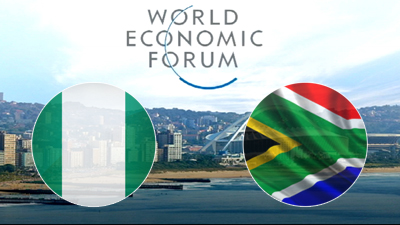The governments of Nigeria and South Africa have failed to implement consistent economic policies that attract foreign investment.
Experts gave updates on Africa’s two biggest economies at a session at the World Economic Forum in Africa currently underway in Durban.
They say both countries are failing to give clear signals on what their economic policies are -and this is making it difficult for investors to do business with them.
A panel of experts say Nigeria and South Africa need clear long- term economic policies to boost growth. They say both countries also need to eradicate corruption.
Both South Africa and Nigeria account for sixty per cent of Sub Saharan Africa’s GDP. The two are also facing a series of economic challenges as a result of falling commodity prices and slow demand from China.
Executive Vice president Europe and Africa Mitsubishi, Haruki Haya-Shi says: “What I can tell you is probably the consistency and probably the running of the policy once it has been implemented and that will attract a lot of foreign investors to continue to be involved.”
Nigeria is completely commodity dependent from oil and I think two other things were largely instrumental in the decline in Nigeria”
In January Fitch ratings agency downgraded the outlook on Nigeria’s long term debt to negative from stable. Tight foreign liquidity and low oil production has contributed to Nigeria’s first recession since 1994.
Like South Africa, it expects limited economic recovery this year with growth of 1.5%.CEO of Verod Capital Management Nigeria, Danladi Verhe-ijen says:
“Nigeria is completely commodity dependent from oil and I think two other things were largely instrumental in the decline in Nigeria. Along with the commodity crash there was also militant activity in Nigeria which dramatically reduced oil production so 90 % of the federal government revenue foreign exchange comes from oil so that was a massive hit for government. And secondly was the failure of the previous government to diversify the Nigerian economy and we were largely an elite consumption driven economy.”
CEO at IDC, Geoffrey Qhena diagnoses South Africa’s growth slowdown, “So, why are we here and I think for me it’s the pace at which we have tried to drive intra African trade and we have relied largely on Europe, and America and the rest of the world. So when those economies slowed down we have been affected. We have spoken on what needs to be done but the implementation has been the problem.”
Massmart Holdings chairman, Kuseni Dlamini says South Africa needs to look beyond the recent downgrades and start having a conversation about an investment grade recovery plan that is vigour.
He says we can learn from the Nigerian government’s growth and recovery plan from recession which is showing some green shoots.
“We have lots of countries that have been through this and lets benchmark ourselves to international best practices and emulate and get out of this. We have strong institutions, strong parties across the political landscape and in Nigeria I think the politics is coming back nicely there is stability there is a new plan. And we can pull ourselves up and get to investment grade.”
– By Amina Accram


